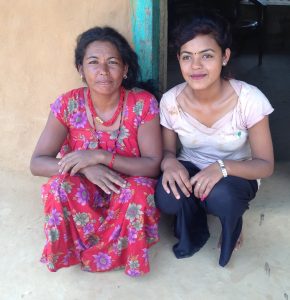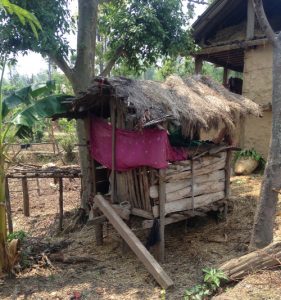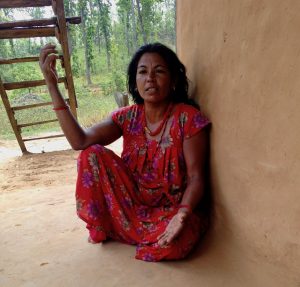Seema is 17 years old and lives with her mother, Parbati, and the rest of her family on the outskirts of Gutu, Surkhet. She is a lively young woman and is currently in Year 10 at the local school, Giwan Gyoti. Seema spends most of her time studying and helping her family out on the fields. She loves school and gossiping with her friends, as well as spending time with her family. When I meet her, she is enjoying a delicious traditional breakfast of Dal Bhat and Tarkari on the porch with her mother.
Parbati and Seema
I am apprehensive about breaching the subject of Chhaupadi, as I know many young women feel uncomfortable talking about menstruation, especially with a stranger. But Seema and her mother are very welcoming and open, immediately offering us ripe mangos and cold water to quench our thirst in the 40-degree heat. Feeling more at ease (and hydrated), I decide to find out more about Seema’s experience of Chhaupadi. First, I want to understand her perception of menstruation. She explains that it all boils down to impurity: “When you are menstruating, impure blood comes out of your body. This means that you are also impure, and you have to make sure that you aren’t going to contaminate anyone else, especially men. This is why you stay in a Chhau Goth.”
I have read about Chhau Goth’s before. A Chhau Goth is generally a hut, specifically constructed for menstruating women. These huts lack even basic protection: the doors do not lock and sometimes there are no walls. This is particularly problematic in the winter, when temperatures drop and women are left at risk of pneumonia. In the summer, women face sweltering temperatures, augmented by the lack of ventilation within the tiny space in which they must stay. Monsoon season brings new challenges, as there is no shield from the frequent rain and thunderstorms. In addition to this, women are vulnerable to wild animals, insects and snakes. All in all, a Chhau Goth is an extremely unpleasant space in which to stay every month.
I ask Seema to show me her Chhau Goth, and I must admit that I am even more shocked when I see it in reality. I can barely imagine spending even one hour in such a confined, unsanitary and unsafe space, and Seema tells me she has spent 5 days in her Chhau Goth every month since she got her first period.
The family Chhau Goth
So why exactly do women feel that they have to stay in such conditions every month? Parbati, Seema’s mother, explains that: “We don’t like practicing Chhaupadi, but we have to do it. It’s not a choice. I used to stay in inside but then I got sick. I went to the Dhami (traditional healer) and he told me that it was because I had been staying inside, and God was punishing me. So I started staying outside. I hate it, but I don’t want God to get angry with me again…. I am afraid that he will send snakes to my home. So I would rather just endure these conditions every month.”
Seema’s mother, Parbati, talks about why she follows Chhaupadi
And Seems agrees: “I don’t like it… it’s very dangerous, animals can attack you or strangers can come in. But what can I do? If I stay in the house, God will become angry and He will send snakes and tigers to attack us.”
Through their words, it becomes clear that these women do not want to practice Chhaupadi. Staying in a Chhau Goth is associated with many physical and mental risks. It is also uncomfortable and incredibly dangerous. But for them, this is a decision of God, and failing to follow Chhaupadi can lead to negative consequences. Seema and Parbati are willing to spend 5 days per month in these conditions in order to protect their families.
Listening to Seema and Parbati, the difficulty of changing a cultural practice hits me. But it also inspires me. I am left hopeful that awareness, education and time will allow them to stop this harmful practice and to stay in the safety of their homes when they are menstruating.
Posted By Boroka Godley (Nepal)
Posted Jul 11th, 2019





4 Comments
Rachel Wright
July 11, 2019
It’s interesting to hear girls’ first-hand perspectives on Chhaupadi and the reasons why they and their families still practice this custom. I’m greatly looking forward to hearing the stories of more girls and how the work of CAED fits in with these underlying beliefs.
Emily
July 15, 2019
This is a beautifully written blog post Boroka. My heart really aches for these women. It’s really interesting to see how deeply religion affects daily life for these women. Your work is so important and I’m excited to learn more about it in the near future!
Abby Lahvis
July 15, 2019
I loved the profile on these two women. I think it is important for us to understand why they feel the need to practice this before anything will change.
iain
July 15, 2019
Good blog Boroka! You’re starting to get under the skin of this issue and write very well. Good photos as well! Particularly interesting that Seema talks of “impure blood.” Imagine that you have to persuade these young women that is actually completely natural. How would you integrate that into your training? More profiles please…!